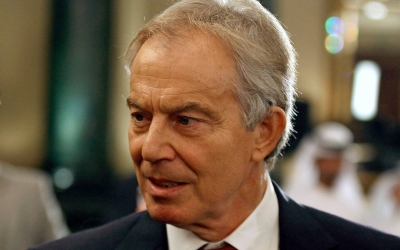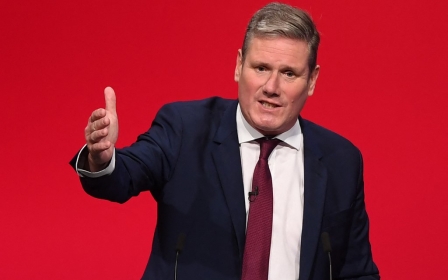UK government ban on Hamas passes as opposition deemed 'politically sensitive'

The British government's plan to proscribe the political wing of Hamas has passed through the House of Commons without a vote, as sources in the opposition Labour Party told Middle East Eye it would be too politically sensitive to raise objections.
The amendment to the Terrorism Act 2000 passed through the lower house of the UK parliament on Wednesday afternoon following a debate. It will go to the upper chamber, the House of Lords, on Thursday.
Members of parliament have to object to a motion for approval in order for it to be put to a vote. A source on Labour's left wing said that while opposing the proscription of Hamas might be the correct position, publicly doing so would mean "putting a cross on one's back".

Nick Thomas-Symonds, representing Labour's front bench, supported the motion to ban Hamas's political wing in the House of Commons on Wednesday.
During the debate concerns were raised about how the ban would impact on efforts to facilitate dialogue between different actors in the region, and about how the British government would help with humanitarian missions in Gaza, which is governed by Hamas.
The Conservative MP Crispin Blunt told the House of Commons that the Palestinian people had a "right to resist", and pointed out that under international law, Israeli military targets were legitimate. He said the ban would have a "chilling effect".
The Scottish National Party's foreign affairs spokesperson Alyn Smith said his party felt some "unease" about proscribing Hamas in its entirety. He said his party would not stand in the way of the ban, but that it required "more scrutiny".
Labour politician Hilary Benn, a former shadow foreign minister, expressed his concern over the effect the ban on Hamas could have on the work done by humanitarian organisations and groups such as Forward Thinking, which facilitate dialogue across the Middle East.
On Tuesday, Labour's shadow foreign secretary, Lisa Nandy, told Jewish News that the ban was "absolutely the right thing to do".
She said the rationale for the move was that "there is no longer any meaningful distinction to be made between the military and political wings of Hamas."
'Political hot potato'
Labour members of the House of Lords hold a weekly meeting on Wednesday afternoons. One peer told MEE that while "anyone serious knows you have to talk to groups like Hamas", the issue was a "political hot potato", meaning that public objections to the ban would most likely not be raised.
While the proscription is seen on the British left as a way of undermining and delegitimising Palestinian solidarity and representation, there is some hope that, in practice, it might end up being too vague to make much of a difference.
'Corbyn has never been a supporter of Hamas, but recognises the need to bring all sides together for dialogue'
- spokesperson for Jeremy Corbyn
The policy change was announced last Friday by Priti Patel, the British home secretary, in a speech at the conservative American think tank The Heritage Foundation.
The day before, Patel's team briefed journalists that the move would cause problems for former Labour leader Jeremy Corbyn, who they said "supports Hamas".
The Conservative minister's move to proscribe Hamas is thought to have been driven by new Israeli Prime Minister Naftali Bennett, and is connected to the outlawing of Palestinian civil society groups.
In 2017, Patel was forced to resign from the government after it emerged that she had failed to be candid with then-Prime Minister Theresa May about 14 unofficial meetings she had held with Israeli ministers - including then-Prime Minister Benjamin Netanyahu - businesspeople and a senior lobbyist.
Middle East Eye has reported recently on a series of meetings between former Labour leader Tony Blair and Hamas leaders. In 2015, as envoy for the Middle East Quartet, the former prime minister invited then-Hamas leader Khaled Meshaal to London for talks aimed at brokering an end to the siege of Gaza.
But British newspapers have illustrated stories concerning the proscription with a picture of Corbyn, fellow Labour MP Andy Slaughter, and "Hamas officials". The photograph was taken during a trip Corbyn made to Gaza in 2010.
A spokesperson for Corbyn told MEE: "Jeremy Corbyn is a supporter of justice and human rights for the Palestinian people, peace and a two-state solution. He has never been a supporter of Hamas, but recognises the need to bring all sides together for dialogue to promote security, peace and justice for both peoples."
Labour more explicitly pro-Israel
Hamas is the de facto ruling authority in the Gaza Strip, having been elected by voters in the besieged enclave in 2006. British politicians from across the spectrum have long acknowledged the need to engage in dialogue with the movement if progress is to be made on bringing peace to Israel-Palestine.
Another Labour source told MEE that attempts by Conservatives to divide Labour over a sensitive issue would most likely fail in this instance, because no Labour politician would risk being branded a terrorist sympathiser.
Britain's main opposition party has been divided over the issue of Israel-Palestine, with Corbyn and his supporters accused of antisemitism - in part because of their support for the Palestinian cause.
A recent Jewish News article claimed that the left-wing Muslim MP Zarah Sultana, a vocal supporter of the Palestinian cause, was facing de-selection by her constituency in the English Midlands because of her "views on issues such as Israel".
Often the target of Islamophobic abuse, Sultana has not received any support from current Labour leader Keir Starmer.
Since he took over from Corbyn, Starmer has sought to make the party more explicitly pro-Israel. In a recent speech given to the Labour Friends of Israel (LFI) lobby group, Starmer said opposition to Zionism "denies the Jewish people alone a right to self-determination".
The speech was deemed "colonial" by British Jewish and Palestinian campaigners, who also criticised Starmer for the support he offered Israel's UK ambassador Tzipi Hotovely, who believes Israel should annex the occupied West Bank and wants to ban marriage between Israeli Jews and Palestinian Muslims.
Middle East Eye delivers independent and unrivalled coverage and analysis of the Middle East, North Africa and beyond. To learn more about republishing this content and the associated fees, please fill out this form. More about MEE can be found here.





